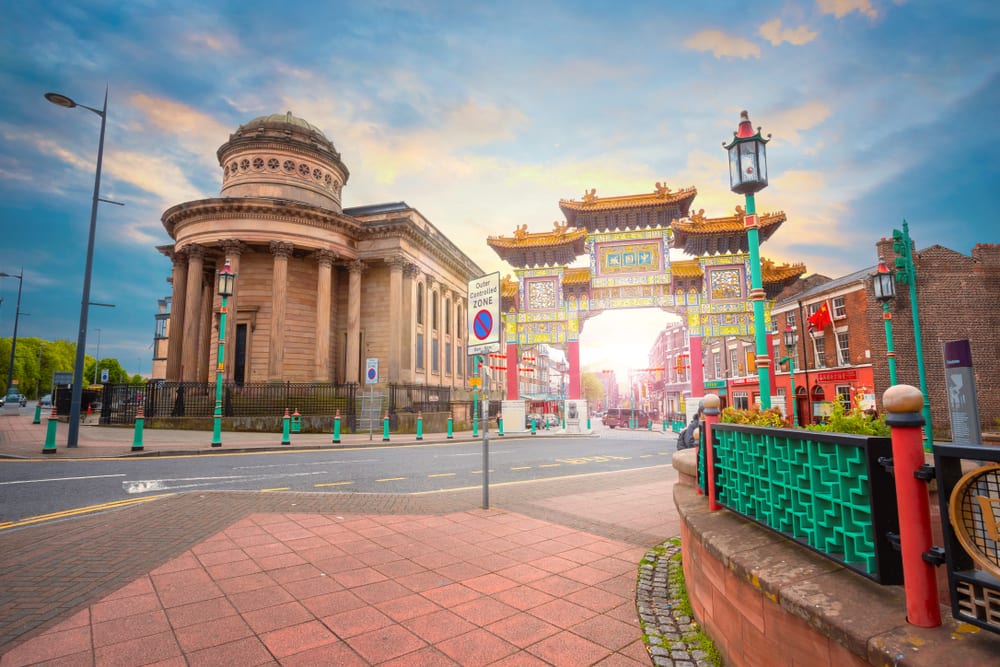
Culture
The incredible history of Chinatown Liverpool
5 years ago

The city may not be able to welcome Chinese New Year in its usual flamboyant style this year but there’s still plenty to celebrate.
Chinese New Year falls on February 12 and this year is the Year of the Ox, an animal that symbolises strength and determination.
Liverpool will be celebrating at home with a series of online festivities brought to you by Culture Liverpool. Info here.
It’s something we’ll all need as we continue the fight back to normality after Covid-19, and it’s something our Chinese Community has had since it arrived and flourished…
Oldest Chinese Community in Europe
Liverpool has the oldest established Chinese communities in Europe, created thanks to trade links between China and Britain via the ports of Shanghai and Liverpool.
The main trading goods were silk and cotton wool. The first vessel arrived in Liverpool direct from China in 1834 and, with the revision of the East India Company’s charter, the China trade was thrown open to private enterprise for the first time.
Early settlers

The first wave of Chinese immigrants arrived in 1866 with the establishment of the Blue Funnel Shipping Line, a branch of the Holt Ocean Steamship Company which ran the first commercial line established to focus on Chinese trade, importing tea, cotton and silk from Shanghai.
Chinese sailors who decided to stay in Liverpool and work from here settled in the city close to the docks in Cleveland Square, Pitt Street and Frederick Street – the area which became known as Chinatown. Boarding houses were opened by the Holt Shipping Company to accommodate their workers and it was there and in surrounding areas that the first Chinese settlers started their own businesses, setting up shops and cafes, and supplying services to their fellow countrymen.
Where is Chinatown?

Chinatown Liverpool sits between the Anglican Cathedral and the dockland. There are 12 streets that make up Chinatown, from the Baltic Triangle area up towards the Ropewalks.
During the 1970s Nelson Street became the new hub of Chinatown and the business area was extended into Berry Street, Duke Street and Upper Pitt Street.
War effort

When World War One started, there were up to 6,000 Chinese seamen in the British Merchant Navy and around 1,500 of them were based in Liverpool.
During WWII, the British Merchant Navy started recruiting sailors from its allies across the world and Liverpool became a reserve pool for Chinese Merchant sailors, with up to 20,000 registered.
Thousands of the Chinese sailors lost their lives during attacks from German submarines and, as part of the British fleet, the Chinese sailors played an important role in Britain’s victory.
The Imperial Arch at the entrance to Chinatown is the largest outside China

It’s around 13.5 metres – or 44ft tall – and the Imperial Arch was given to Liverpool as a gift from its twin city of Shanghai.
It was shipped over piece by piece in 1999 and rebuilt by 20 specially selected craftsmen from Shanghai in time for Liverpool’s annual Chinese New Year celebrations around Nelson Street in 2000.
There are 200 dragons on the wooden and marble structure which symbolises the eternal friendship between the two great seafaring cities. It is the focal point for Liverpool’s annual Chinese New Year festivities and the award-winning landmark has become one of Liverpool’s best-loved and most-visited attractions.
According to Feng Shui experts, it will protect Chinatown from evil, and bring good luck and fortune to the area.
Twin cities
We’re not only celebrating #ChineseNewYear in Liverpool this weekend we are also celebrating 20 years since our city twinned with #Shanghai ✨??✨
More in our video #GongHeiFatChoy ? >https://t.co/kvRiZtAqrA#CNYLiverpool ✨ @CultureLPool ✨@lpoolcouncil ✨ @VisitLiverpool pic.twitter.com/Cl3phix1Pz— The Guide Liverpool (@TheGuideLpool) February 9, 2019
Liverpool was twinned with Shanghai in 1999 to build on the historic shipping trade links forged over a century earlier.
* Liverpool was the only UK city to have a pavilion at the Shanghai World Expo in 2010.
* In 2015, one of Liverpool’s oldest companies, Henry Bath, received more than $60m Chinese equity investment and consequently set up a warehouse in the Shanghai Free Trade Zone.
* There have been multiple trade delegations between the two cities.
* The University of Liverpool partnered with Xi’an Jiaotong University in 2004 to create Xi’an Jiaotong-Liverpool University in Suzhou.
* In 2018, Liverpool John Moores University set up the first LJMU China Centre in Shanghai.
* Liverpool was selected as the host city of UN Habitat World Cities Day 2018, a legacy of Shanghai Expo 2010. Shanghai sent a delegation of more than 70 civic and business delegates to attend.









 Subscribe
Subscribe Follow Us
Follow Us Follow Us
Follow Us Follow Us
Follow Us Follow Us
Follow Us Follow Us
Follow Us











